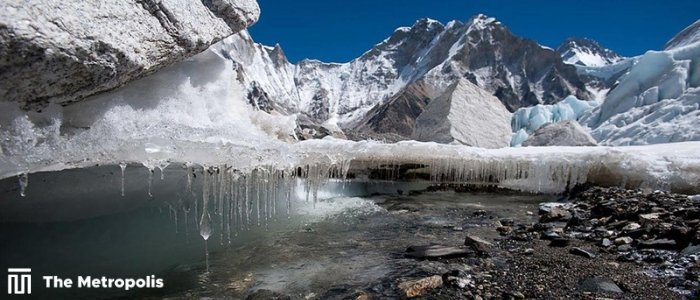Water drips under Nepal’s Khumbu glacier as the ice melts (Photo: The Guardian)
Metropolis Desk-
At least one-third of the Himalayan glaciers, which are among the world’s most important water supplies, are forecast to melt by the end of the century even if the most ambitious measures to stop global warming are successful.
According to the paper “The Hindu Kush Himalaya Assessment,” if nothing is done and greenhouse gas emissions continue at their current rate, that loss might increase to two-thirds by the year 2100.
According to the paper, the 2,000-mile Hindu Kush and Himalaya range, which runs from Afghanistan to China, provides water for more than a fifth of the world’s population. The range is home to some of the tallest mountains in the world, including Everest and K2, and is known as the “Third Pole” because of its enormous ice store. The erosion of these peaks and the waterways they support could interrupt the flow of food and water, resulting in floods, and forcing a large number of people to move.
The report’s lead author, Philippus Wester of the International Centre for Integrated Mountain Development, called it “the climate crisis you haven’t heard of.” Even if we are really ambitious in our efforts to meet the climate change targets, we will still lose one-third of the glaciers and be in jeopardy. The startling discovery for us was that.
According to the paper, the region, which is home to 240 million people, has already experienced thinning ice due to rising temperatures since the 1970s. The research also mentions the potential destruction it might do to the nearby vulnerable communities, many of which exist at or below the $1.90 per day global poverty line, even though an increase in temperature of a few degrees may not sound dramatic.
One of the first comprehensive descriptions of how warming will affect mountains and mountain communities is intended by the report, which was produced over five years with the participation of 350 scientists and experts. The effects of climate change on the area weren’t obvious prior to this report. However, Wester added, “We actually do know enough today to act, and action is urgently required.
The approaching disaster caused by unregulated, man-made global warming, according to a historic United Nations assessment released in October, is only becoming more urgent. If ambitious goals to reduce emissions are not fulfilled, the globe may breach the 1.5°C (2.7°F) threshold, at which humanity will begin experiencing the worst effects of climate change, as early as 2030.
Source – CNN



